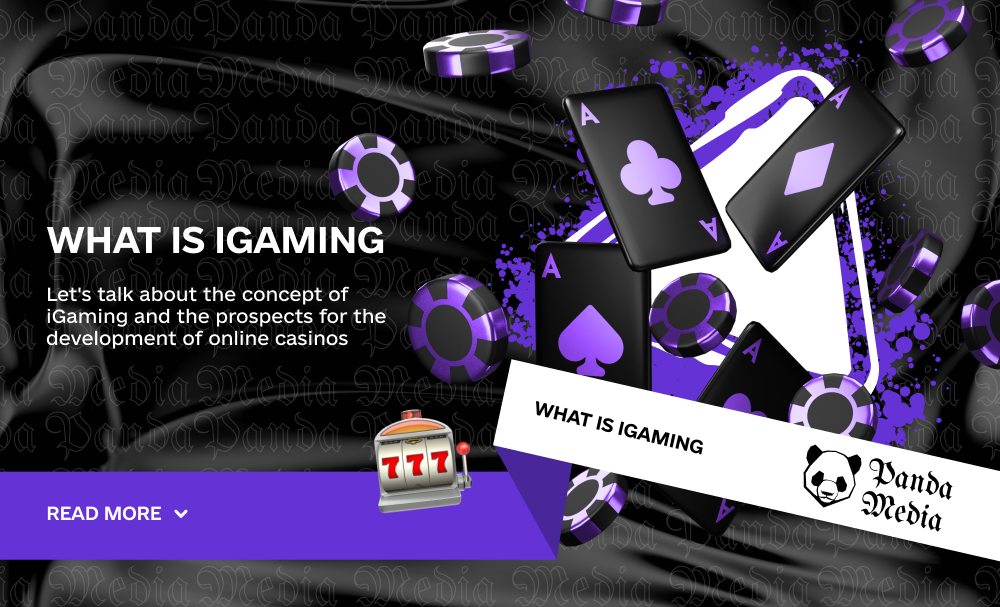Don't miss interesting news

Playing for luck or betting on sports events has become a popular way to spend time, and for some, even a favorite hobby in many countries. With the advancement of technology and the Internet, this activity has naturally moved to the online space. The online gambling market is developing in step with the progress in web technologies. The connection between online technologies and entertainment has become the basis for the name of this industry – iGaming.
The success of this industry is largely due to its transition to the virtual space, where participants have continuous access to online games.
The definition of “iGaming” can be applied both in a narrow and broad sense. In a narrow context, iGaming refers to online gambling through electronic means. Thus, the letter “i” in the word iGaming symbolizes the Internet, while “Gaming” refers to the gambling industry.

iGaming is an online betting industry that uses electronic platforms.
However, in a broader sense, in addition to online betting, iGaming includes gambling, which includes casinos, sports betting, sweepstakes, lotteries, bingo, and card games.
When we use the term iGaming in a broad sense, we mean an industry that encompasses a variety of online activities and organizations within those activities.
For example, a company that develops gaming software for online casinos (a game provider, if you will) is part of the iGaming market in its broadest sense. Likewise, a developer of software gaming platforms such as SOFTSWISS is included in the category of software providers for the iGaming industry.
Unlike gambling, the outcome of which is largely influenced by chance or luck, there are games that require certain skills from players.
The first ones include online casinos, sports betting, sweepstakes, online lotteries, bingo, fantasy sports, and eSports. The latter include card games (poker, blackjack, bridge, etc.), as well as chess, backgammon, and other games where the outcome depends more on the player’s intellectual abilities than on chance.
There is some uncertainty as to whether games in the second category should be included in the broader definition of iGaming. Nevertheless, you will definitely meet representatives of both categories at iGaming events.
Every year, more and more technologies appear that will have an impact on the growth of the online gambling market. Let’s analyze them in more detail.

There are two types of online casinos based on blockchain technology: cryptocurrency casinos with the integration of cryptocurrency payment systems and blockchain casinos.
In the first case, an online casino accepts deposits and allows withdrawals in cryptocurrencies such as Ethereum (ETH), Litecoin (LTC), Bitcoin (BTC), along with fiat currencies. Usually, such transactions are made available through the integration of cryptocurrency payment systems.
In the second case, cryptocurrency transactions take place without intermediaries, directly between the player’s cryptocurrency wallet and the blockchain network through the game.
The technology records the results of the game, which excludes the possibility of any influence on them. Blockchain also ensures maximum anonymity, as no personal information is required when registering a user account at a casino.
The use of blockchain technology in online gambling has numerous advantages. Withdrawals are processed almost instantly, with no delays to start betting.
Besides, iGaming operators working with cryptocurrencies offer the lowest fees for deposits and withdrawals. The reason is the absence of intermediaries and decentralization.

Webcasts are in high demand in the iGaming industry, so it is not surprising that interest in streaming and video materials is growing.
Streaming allows viewers to observe the actions of their favorite streamer, who places bets in real time and shares impressions of the key moments of the game. Streamers try to make the broadcast bright and exciting by choosing slots with frequent bonuses and generous winnings, sparing no emotions during the broadcast.
This attracts the audience to online casinos, especially when a certain operator and a streamer work as partners. The streamer places useful information for players on his resource, including operator ratings, as well as banners and links to the partner casino website.
Not every streaming platform supports gambling advertising. For example, in 2021, Twitch banned videos and broadcasts containing promotional codes and referral links to gambling websites. The platform required streamers to remove such content, although it did not disappear completely.

In order to attract the youth audience and keep them interested in the game, online casinos try to enrich their content with gamification elements. Gamification involves the integration of additional game elements into the game process to increase player engagement and loyalty. These elements include character selection, quests, rewards for reaching levels, and much more.
Thanks to gamification, operators can increase the retention rate of players by motivating them. Depending on the chosen mechanics or gamification tool, operators meet different needs of players.
For example, holding tournaments gives players the opportunity to compete and win the championship among others. The most successful players are displayed in the leaderboard and receive various bonuses from online casinos.
The choice of a character takes into account the personal preferences of players, which positively affects their involvement and interest in the gameplay.
Quests are exciting and interesting tasks that become more difficult with each level. For the successful completion of the quest, the player receives a reward, which encourages him to continue playing.

Currently, many slots are developed using HTML5. This technology allows users to enjoy fast-loading, small-sized games that work efficiently on different platforms. However, HTML5 is not the only standard in the creation of slot games. Unity, an engine for the development of three-dimensional game content that is gaining popularity among mobile and desktop games in general, is gaining increasing attention.
The download speed has a direct impact on the loading time of games. In this context, 5G technology comes to the rescue. Although this technology mainly benefits players rather than iGaming operators, 5G offers a way to improve the gaming experience in casinos or sports betting.
In recent years, there have been a number of circumstances that have influenced the growth of online gambling: the COVID-19 pandemic, forced quarantine, and progress in mobile technology. This gave impetus to the shift of the gambling market from offline casinos to the online space. iGaming is developing rapidly thanks to the latest information technologies, software, blockchain, and mobile developments. If any of the above sounds familiar to you, then you have probably already dealt with iGaming.